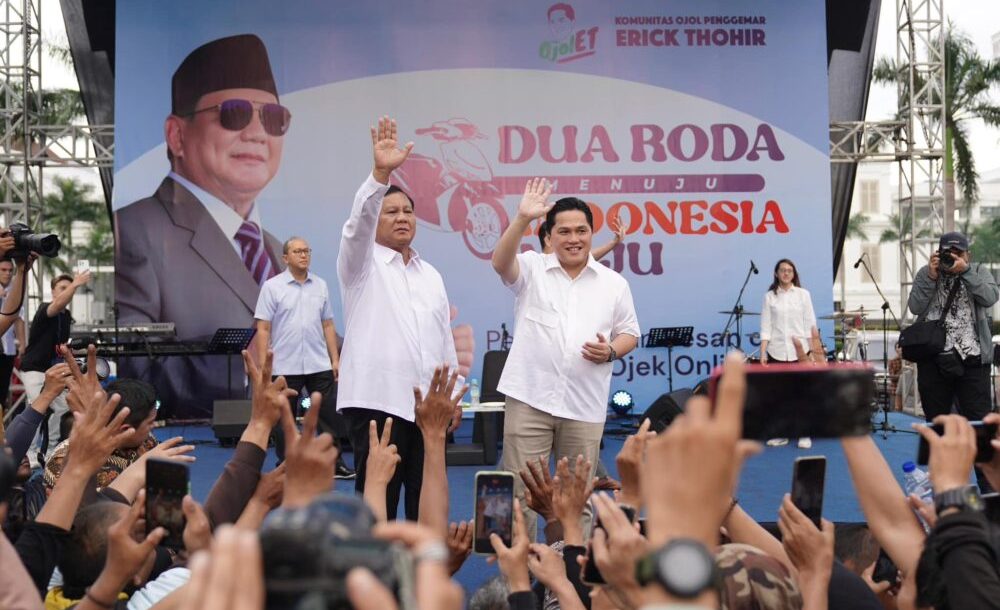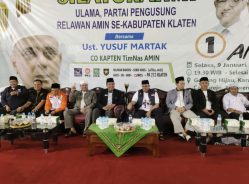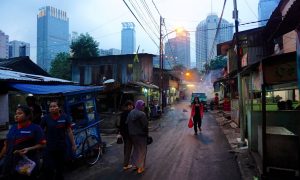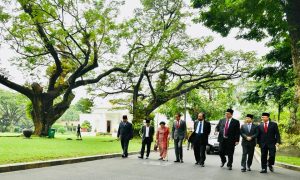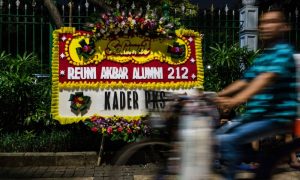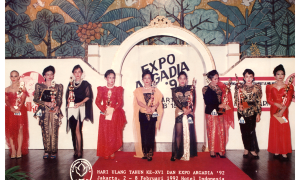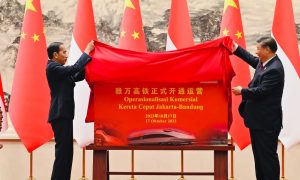Numerous business figures are occupying pivotal roles in each Indonesian presidential candidate’s campaign teams. Arsjad Rasjid, the chairman of the Indonesian Chamber of Commerce, or KADIN—Indonesia’s largest and most influential business association—is leading Ganjar Pranowo’s campaign. Rosan Roeslani, a businessman and former Indonesian ambassador to the United States, heads Prabowo’s team. Thomas (Tom) Lembong, a businessman and former minister of trade during President Jokowi’s first term, is key member of Anies Baswedan’s team.
The participation of business leaders in politics is not a new phenomenon. Previously, figures like Jusuf Kalla, Surya Paloh, and Hasyim Djoyohadikusomo have been key players in political parties—in the case of these men, in Golkar, Nasdem, and Gerindra respectively. The notable difference in the current scenario is that Arsjad, Rosan, and Tom are not affiliated with any political party; they are independent businessmen with stakes in publicly listed companies. Other younger business figures like Erick Thohir and Sandiaga Uno are involved with PAN and PPP respectively, but their participation is mostly behind closed doors, rather than as visible, active members. Both seem limit the display of their involvement with the parties.
Conducting business in Indonesia often necessitates active engagement with the government, with support from executive authorities being a crucial factor. Poor relations with the regime can impede business operations—as evidenced by Prabowo Subianto’s admission in a 2023 interview that his business stagnated due to limited access to executive power, possibly exacerbated by his years in opposition. Similarly, Surya Paloh’s business faced regulatory challenges under Jokowi’s administration after his Nasdem Party pledged support for Anies Baswedan’s presidential candidacy.
In separate interviews for my research conducted in Jakarta during 2018–19, one businessman in the mining explosive services sector mentioned that the government took over a major contract of his in favor of state-owned enterprises (SOEs) because the government saw the business group he belonged to as being a part of the previous government of Susilo Bambang Yudhoyono. Another entrepreneur in environmental and waste management revealed that his company was blocked from securing contracts with SOEs, as other private business groups with closer government ties were preferred.
Political parties often serve as a means for businessmen like Surya Paloh and Prabowo to renegotiate their relationships with the regime, benefiting their enterprises. Businessmen outside political party structures also engage in donations to political parties for political connections and assurances.
More recently, however political parties are not the only avenue for building these connections. Businessmen without direct party affiliations are increasingly comfortable participating in electoral politics. The perceived risks to their businesses if their supported candidates lose seems minimal, even without the backing of political parties. What enables this scenario?
My research has suggested that the risks for businessmen engaging in electoral politics are minimal for two reasons. Firstly, increasingly influential organisations outside formal political institutions have become new vehicles for political lobbying. Some of these organisations have gained considerable political power over the last decade.
Secondly, the strategic distribution of corporate equity and appointment of board and management has become an important way for business figures to manage political risks. My research illustrates how ownership of politically-exposed companies has been diversified among multiple businessmen and politicians, highlighting the evolving landscape of business–politics interplay in Indonesia.
It is important to note that for politicians, involving businesspeople in their campaign teams can also offer valuable benefits, such as access to capital and enhanced managerial efficiency. Businesspeople are often skilled managers and adept problem-solvers, qualities that can significantly contribute to the effectiveness of a political campaign. It’s important to recognise that the relationships between businessmen and politicians are multifaceted and not solely defined by financial and monetary interests.
KADIN and HIPMI as political tools
Business–politician connections are increasingly being established through social platforms such as alumni associations of universities and schools, religious groups, professional bodies, and business associations.
Two notable organisations that facilitate these connections are the Indonesia Chamber of Commerce (KADIN) and the Indonesia Youth Entrepreneur Association (HIPMI).
The current chairman of KADIN, Arsjad Rasjid, is on a leave of absence to lead Ganjar’s campaign. Roesan Roslani, a former KADIN chairman, leads Prabowo’s campaign. Bahlil Lahadalia, the minister of investment and a key figure in Prabowo’s campaign, previously chaired HIPMI. Sandiaga Uno, also a former chairman of HIPMI (2005–08), plays a notable role in political circles. The current chairman of HIPMI, Ackbar Himawan Buchari, is actively backing the Prabowo-Gibran campaign.
Indonesian Islamists’ pragmatic pivot in 2024
Hardliners are adapting to electoral realities—and state restraints—in mobilising for Anies Baswedan.
My sources have also mentioned that KADIN and HIPMI, which both have strong ties to Jokowi’s government, are discreetly contributing to Anies’ team to avoid conflicts with the current administration, as Anies is perceived as an opponent to Jokowi’s regime.
KADIN and HIPMI have become vital networking hubs for businessmen seeking political support. These organisations maintain ongoing communication with key governmental departments such as the Ministry of Investment, the Coordinating Ministry of Economic Affairs, the Coordinating Ministry of Investment and Maritime Affairs, and even with police and military establishments. These communications are important to secure supports such as permits, licenses, and access to government projects.
Members of HIPMI and KADIN often have affiliations with political parties as well. While these organisations are not the only avenues for businessmen to secure political support outside of political parties, they stand out due to their institutional strength and significant political influence.
Ownership diversification and well-connected executives
In the realm of business and politics, the intertweaving of ventures and ownership has created a robust network of trust and relationships. This is evident in various instances where business ownerships are shared between businessmen and politicians, or those who hold dual political and corporate roles.
These collaborations are often facilitated through two methods of corporate actions. The primary method includes share transactions and acquisitions, where one company acquires or purchases shares of another. The second method involves appointing commissioners or executives with strong political connections.
A notable example of the first method occurred in 2018, ahead of the 2019 election. At that time, Saratoga Capital, owned by Sandiaga Uno, Prabowo Subianto’s running mate, sold its shares to Luhut Pandjaitan’s firm Toba for US$9 million. Luhut was a supporter of Jokowi’s reelection. This transaction, while legal, highlighted the strategic distribution of shares during politically sensitive times.
Another example of complex ownership structures is PT Adaro, one of Indonesia’s largest coal producers. It is partly owned by Garibaldi Thohir and by Saratoga Capital, linked to Sandiaga Uno. The intricate ownership network provided a safety net for the involved businessmen during the 2019 election, where Sandiaga and Erick Thohir (Garibaldi’s brother) were found on opposing sides.
The coal and mining sector presents some of the most illustrative examples of complex ownership structures. A report by Project Multatuli reveals how ownership is distributed among groups that, despite having diverse political affiliations, share common commercial interests.
The second method, appointing well-connected commissioners or executives, is exemplified by Rukun Rahardja, company owned by Happy Hapsoro, the husband of senior PDI-P figure Puan Maharani and a PDI-P financier, is supporting Ganjar Pranowo in the presidential election. His company has commissioners like Arsjad Rasjid and Rachmat Gobel, a Nasdem politician supporting Anies Baswedan. The unique aspect here is that the company’s stakeholders are active politicians supporting different presidential candidates.
Beside commissioners, an example of an executive position linking politically opposed business figures is Justarina Sinta Marisi Naiborhu, once an executive at Luhut’s Toba and a family member Luhut, who moved to a senior position at Kalimantan Industrial Park Indonesia (KIPI), a significant green industrial park project owned by Garibaldi Thohir. Justarina, it seems, is not only a good manager, but also well-connected with key politicians.
It’s worth noting that family members are not typically the preferred choice of politicians for executive roles in private corporations. Instead, politicians often recommend individuals for executive positions based on trust established through various previous interactions and engagements.
Having a trusted individual at the executive level benefits politicians by allowing them to influence corporate decisions, such as vendor selection and procurement. For businessmen, employing well-connected executives aids in navigating the complexities of permitting and licensing procedures that often are as political as they are technical.
Executives with both political connections and managerial skills are rare, as not many individuals possess both these competencies. Figures like Sandiaga Uno, Rosan Roslani, Arsjad Rasjid, and Tom Lembong are part of a select group who excel in managerial skills while also maintaining political connections.
The primary function of well-connected executives and commissioners is to serve as a bridge between political and business interests. They play a crucial role in maintaining open channels of communication and fostering relationships within the corporate sphere, independent of formal political institutions.
Conclusion
For risk-averse businessmen, involvement in electoral politics is often viewed as a high-risk endeavor. Traditionally, they have relied on their position within political parties to mitigate these risks.
However, in recent times, robust institutions like KADIN and HIPMI, along with strategies such as diversifying ownership and employing specific corporate recruitment tactics, have emerged as alternative means for securing political assurance in both the business and political realms.
Businessmen can used either or both of the above strategies, making sure to make deals with the right actors within HIPMI and KADIN, and/or making transactions with the right politicians in asset diversification.
These approaches facilitate the development of connections and relationships within the political sphere, enabling businesspeople to participate in political activities with a degree of independence from traditional political party structures.
 Facebook
Facebook  Twitter
Twitter  Soundcloud
Soundcloud  Youtube
Youtube  Rss
Rss 